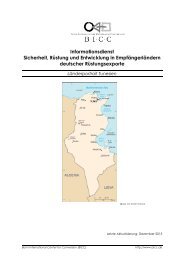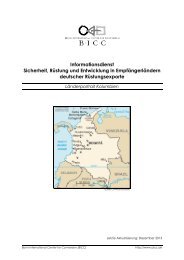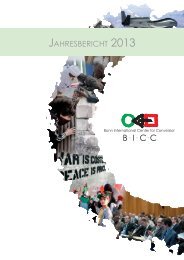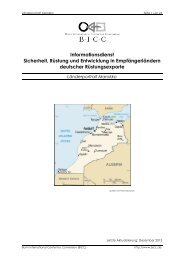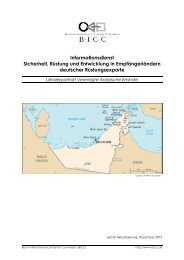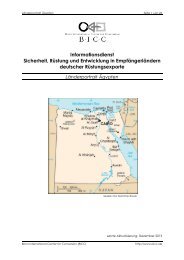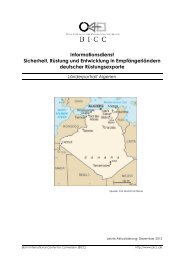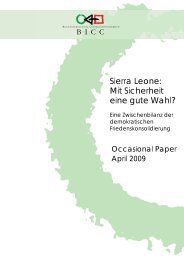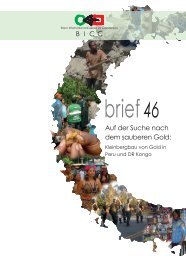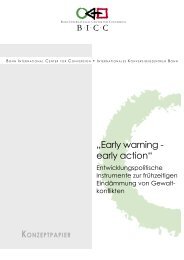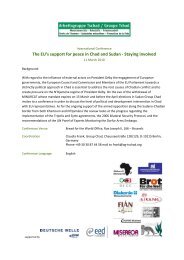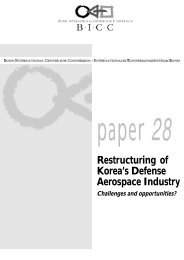English - BICC
English - BICC
English - BICC
Create successful ePaper yourself
Turn your PDF publications into a flip-book with our unique Google optimized e-Paper software.
of undermining the rights of voters or<br />
this party is a nonsense (sic)” (Irish<br />
Times, 11 May 1998). Adams also<br />
insinuated that the IRA’s weapons had<br />
already been “taken out of<br />
commission” by having been placed in<br />
dumps (Irish News, 21 May 1998). Alex<br />
Maskey, a leading member of Sinn<br />
Fein, poured cold water on any hopes<br />
of a start to disarmament by<br />
disbelieving that “anyone on the island<br />
of Ireland expects decommissioning to<br />
begin by any organisation” (Belfast<br />
Telegraph, 25 May 1998). However, a<br />
piece of political kite flying was<br />
undertaken by an unexpected<br />
Republican source in June. Padraic<br />
Wilson, the IRA’s leader in the Maze<br />
Prison, believed that “a voluntary<br />
decommissioning would be a natural<br />
development of the peace process” if<br />
the Agreement was properly<br />
implemented and being seen to work<br />
(Financial Times, 17 June 1998).<br />
Perhaps the retention of weapons was<br />
still a useful, steadying influence within<br />
Republicanism at a time of difficult<br />
political shifts, but a signal was being<br />
sent that the prospect of disarmament<br />
could be used as a spur to the speedy<br />
implementation of the Agreement and<br />
as a means of extracting possible<br />
future concessions. Weaponry provided<br />
a form of security blanket, an<br />
assurance of continuity, but it could<br />
also be used as currency, an incentive<br />
to ensure change.<br />
Appointing a Sinn<br />
Fein representative to<br />
the IICD<br />
A chink of light had appeared in the<br />
debate, one which widened in September<br />
1998, when Martin McGuinness<br />
was appointed as Sinn Fein’s<br />
representative to the IICD.<br />
McGuinness, however, was not<br />
officially representing the IRA, a move<br />
designed both to insulate Sinn Fein<br />
from connection with the IRA, and the<br />
IRA from undue pressure to<br />
decommission. At the same time<br />
Adams, in an important statement,<br />
asserted Sinn Fein’s commitment to<br />
“exclusively peaceful and democratic<br />
means . . . . Sinn Fein believe the<br />
violence we have seen must be for all<br />
of us now a thing of the past, over,<br />
done with and gone” (Belfast Telegraph, 2<br />
September 1998). This was widely seen<br />
as the closest Republicans would come<br />
to saying that the war was over.<br />
The timing of these last events was<br />
important. Just a fortnight before, 29<br />
people had died in Omagh as a result<br />
of a bomb attack by Republican<br />
dissidents, the Real IRA. Such was the<br />
universal outcry against these<br />
Republican militants that pro-Agreement<br />
Republicans naturally sought to<br />
put as much distance between<br />
themselves and the taint of militarism<br />
as was politically practical.<br />
Actual decommissioning by the IRA<br />
remained a far off prospect. It was<br />
reported that an IRA convention had<br />
decided in December that the<br />
conditions for decommissioning did<br />
not yet exist (Belfast Telegraph, 8<br />
December 1998). The following<br />
month, an IRA statement voiced<br />
“growing frustration” at Unionist<br />
attempts to resurrect the “old preconditions”<br />
of decommissioning.<br />
Unionism was simply engaged in the<br />
“politics of domination and inequality”<br />
in blocking the speedy implementation<br />
of the Agreement, in particular the<br />
devolution of the power-sharing<br />
Executive, with decommissioning<br />
merely serving as a useful excuse.<br />
Consequently, Unionist demands had<br />
to be “faced down” (Belfast Telegraph, 7<br />
January 1999). Clearly, the IRA was not<br />
about to compromise on this issue.<br />
The effect on Unionists was deeply<br />
unsettling; they took the IRA statement<br />
to be a threat to return to war.<br />
Unionism and<br />
Loyalism, 1996–1998<br />
Ulster Unionism’s reaction to the<br />
Mitchell Commission’s report had been<br />
lacklustre to say the least. Whilst<br />
Trimble viewed it as “worthy of<br />
consideration”, his essential judgement<br />
of it was that it changed nothing and<br />
that it had “simply reaffirmed” the<br />
B·I·C·C<br />
run-up to the agreement<br />
UUP’s belief in elections as the only<br />
way forward (Irish Times, 25 January<br />
1996). This dismissive attitude was<br />
spawned by a continuing distrust of<br />
Republicanism’s real intent and was<br />
reinforced by the weak Conservative<br />
government’s reliance on Unionist<br />
votes in Westminster. Even after<br />
elections, the UUP would only enter<br />
into what amounted to exploratory<br />
dialogue with Sinn Fein; substantive<br />
negotiations would only sprout from a<br />
weapons handover by the IRA (Belfast<br />
Newsletter, 2 February 1996).<br />
However, the end of the IRA ceasefire<br />
curiously softened, rather than<br />
hardened, the UUP stance on the<br />
Mitchell compromise. Trimble stated<br />
that “Mitchell is the thing”; that<br />
adherence in word and deed to the<br />
Mitchell Report summed up his<br />
conditions for negotiating with Sinn<br />
Fein and that if Ulster Unionists had<br />
“reasonable commitments” on the idea<br />
of parallel decommissioning then they<br />
could move in that direction (Irish<br />
News, 1 March 1996).<br />
Indeed, Unionism was fighting a war<br />
of position; whilst mollifying their<br />
position on parallel decommissioning,<br />
they vigorously protected their flank by<br />
attempting to move the British<br />
government beyond its requirement for<br />
the reinstatement of the 1994 ceasefire<br />
as the initial stepping stone for Sinn<br />
Fein’s entry into talks. The ceasefire<br />
criteria would have to be stepped up.<br />
As one source disclosed: “If we haven’t<br />
received a redefinition of ceasefire in<br />
such a way that keeps Sinn Fein out,<br />
then our position [on<br />
decommissioning] is as was” (Irish<br />
Times, 16 October 1996).<br />
All the while of course, the position<br />
remained that it would take the physical<br />
handover of munitions before the<br />
UUP could engage in substantive<br />
negotiations with Republicans (Irish<br />
Times, 25 June 1997). When Sinn Fein<br />
31



